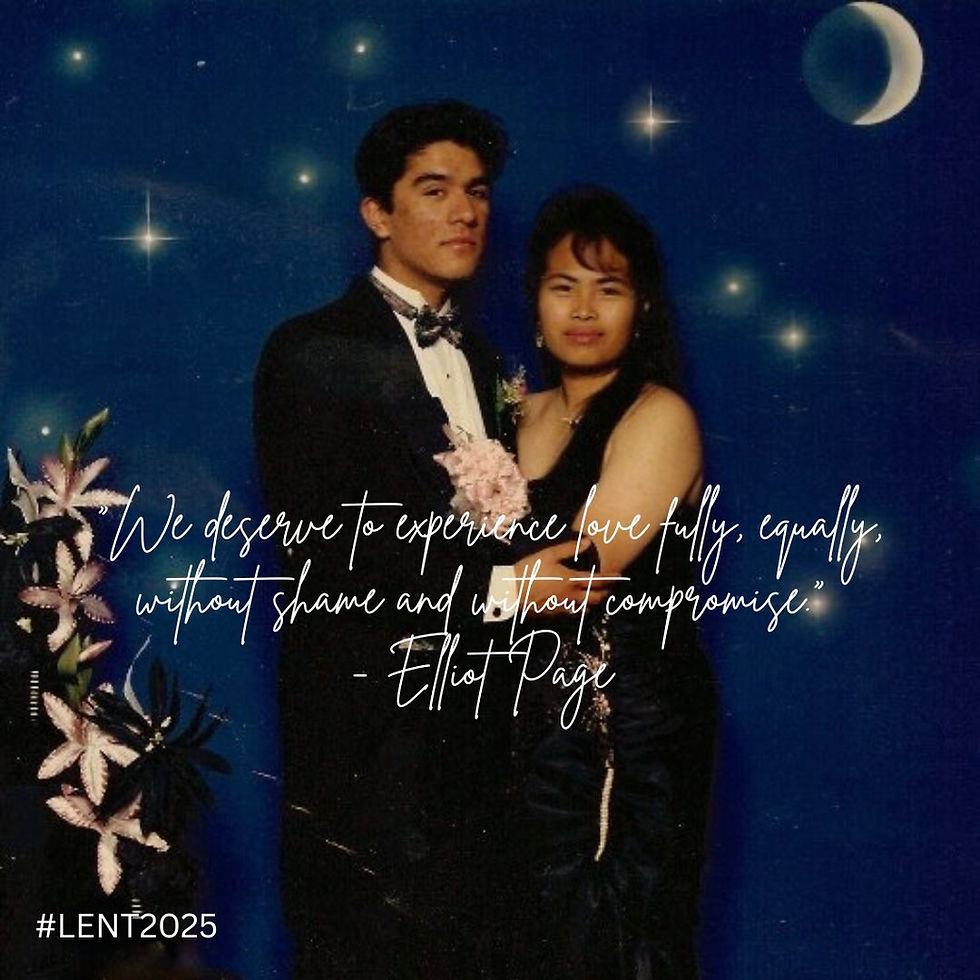Lent 2025 Day 9: Love and Human Connection | A Reflection on Love and Cruelty
- Flannel Diaries

- Mar 14
- 4 min read
"Do not repay evil with evil or insult with insult. On the contrary, repay evil with blessing, because to this you were called so that you may inherit a blessing." – 1 Peter 3:9

Human connection is essential. We are social creatures, drawn toward belonging even if we consider ourselves introverts. No one thrives in complete isolation. My friends and family mean everything to me, and I assume others feel the same. Living in Rochester without any relatives, I have built a vast network of acquaintances but only a small, trusted circle—chosen family, the kind of people who make a place feel like home. They are the reason I have thrived as long as I did and returned when given the opportunity.
The world is shifting, as it always does. We are headed into another recession. The last one brought me to Rochester. It will be interesting to see where this one leads.
I have siblings—two sisters, a brother, a half-sister, a half-brother (siblings from another mother), and a nephew I treat more like a little brother. Family is always complicated, and chosen family can be just as complex. In the queer community, chosen family is often essential because so many are cast out by their blood relatives simply for existing authentically.
I find that un-Jesus-like. Very un-Christian-like. Maybe I was just good at tuning out the fire-and-brimstone sermons about condemning those who are different. I preferred to focus on the “love thy neighbor” and “let he who is without sin cast the first stone” passages—the ones about compassion, community, and lifting each other up.
It’s unsettling how easily people can twist scripture into something cruel. How they have used it to justify enslaving entire peoples, silencing women, and waging wars in the name of God.
It boggles the mind.
I recently came across an article discussing the psychology of evil—how a lack of empathy breeds cruelty. Some researchers believe certain people may lack neurological pathways that connect them to empathy. That would explain how some individuals can commit the most horrific, sadistic crimes without remorse.
As a child, Simon Baron-Cohen learned about the Holocaust and asked himself, “How could people be so cruel?” That question led him to become the world's leading expert on the psychology of empathy, and eventually, he wrote "The Science of Evil." I haven’t read it yet, but I imagine it offers a fascinating—and deeply unsettling—perspective.
Reading about his work made me think of Sam Nordquist, a trans man who was tortured and murdered by seven people. His body was discovered in a field after enduring a month of captivity in a hotel room, where he suffered unimaginable abuse.
The most tragic part?
Sam had left his home in Minnesota in search of love. He thought he had found a connection online. He wanted to build a life with someone, to experience the kind of love that makes existence feel worthwhile. Instead, he was met with hate, cruelty, and sadistic intent. It’s hard to comprehend the kind of darkness that exists in people. Some days, it feels unbearable.
From what everyone who knew Sam has said, he was the kindest, most generous person they had ever met. He had a heart that gave freely, a spirit that lifted others up, and a presence that made people feel seen and valued. He deserved love, safety, and the chance to build the life he dreamed of.
Instead, he was stolen from this world in an act of senseless violence.
It starts to make you wonder—where is the justice in that? How do we reconcile the loss of someone so full of light in a world that allowed such darkness to take him away? And more importantly, how do we honor him in the fight for a world where this never happens again?
I have been angry with people before—angry at their actions, their betrayals, their failures. But I have never wanted to take another person’s life.
I have never been so deeply harmed that the thought of torturing someone in return crossed my mind.
Sure, I have said things I regret, acted out of frustration or hurt, and at times, even been cruel. But true violence, destruction, the desire to erase someone entirely? That has never been in me.
Even the idea of ostracizing someone completely feels extreme to me. I would rather remove myself from a bad situation than eliminate a person.
Maybe that’s why the stories of calculated cruelty shake me so deeply. It is so far from my reality that it perplexes me. In law school, I’ve read case after case detailing the worst of human nature. It never gets easier.
Lenten Reflection: Choosing Love Over Cruelty
Lent is a time to examine the state of our hearts. How do we respond to injustice, hate, and cruelty? Do we allow bitterness to fester, or do we choose love and justice?
1 Peter 3:9 reminds us: “Do not repay evil with evil or insult with insult. On the contrary, repay evil with blessing, because to this you were called so that you may inherit a blessing.”
There is no shortage of cruelty in the world. But cruelty cannot be fought with more cruelty.
To live with love, empathy, and justice is not passive. It is an active choice to stand against evil while refusing to become it. It means:
Standing up for the marginalized without becoming the oppressor.
Holding people accountable without losing our own humanity.
Choosing to love fiercely even when the world tries to teach us hate.
The world will always have darkness. But as long as we choose love over cruelty, we ensure that the light keeps shining. And the darkness will never overcome.
#LENT2025 #spiritualwilderness #lgbtq #transrights #transrightsarehumanrights #sayhisname #samnordquist




.jpg)




Comments